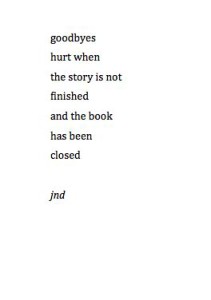
I have written a few posts on why grief following a suicide is so hard. It is that lack of closure that makes it difficult to move forward. We ask the same questions over and over…”Could I have prevented this?” “Why didn’t I see the signs?” “How could they have left me like this?”  It’s like a record playing over and over in your head. It makes it difficult if not impossible to look forward when you are mentally stuck in the past. I believe we spend a great deal of time in the past, because we need to find an end to the story. A number of survivors have told me that they are constantly told to focus on the present, and to not look back. I disagree with this. I believe that we need to go back, in order to move forward. The past helps us create an end to our story. It helps us understand the depth of pain our loved one was in when they ended their life. The key is to not stay in the past. The past is the past, and unfortunately we cannot change the events that have occurred. But I also think it is difficult to move forward without an ending to the story. Find your story. Find an ending that makes sense to you, and makes this tragedy bearable. And know that your ending will likely not match an ending created by anyone else who loved the person you lost. That’s ok. It’s not about finding THE ending, it’s about finding YOUR ending.
It’s like a record playing over and over in your head. It makes it difficult if not impossible to look forward when you are mentally stuck in the past. I believe we spend a great deal of time in the past, because we need to find an end to the story. A number of survivors have told me that they are constantly told to focus on the present, and to not look back. I disagree with this. I believe that we need to go back, in order to move forward. The past helps us create an end to our story. It helps us understand the depth of pain our loved one was in when they ended their life. The key is to not stay in the past. The past is the past, and unfortunately we cannot change the events that have occurred. But I also think it is difficult to move forward without an ending to the story. Find your story. Find an ending that makes sense to you, and makes this tragedy bearable. And know that your ending will likely not match an ending created by anyone else who loved the person you lost. That’s ok. It’s not about finding THE ending, it’s about finding YOUR ending.




Finding this post especially helpful. Two years out and sometimes the depth of grief is rekindled by new events. Living in that place of fear is debilitating and I have been stuckfrom time to time, but always try to get “unstuck. I am moving forward, but an “end” would certainly be helpful in keeping the fear at at bay. I think I can find the “end” to my story. Thank you!
Wonderful article. Thank you!
Thank you. I am dealing with a military loss to suicide. So, not only am I stuck with all of the questions; I am battling the frustration of jumping through the hoops of the Marine Corps to get his records which will help me find MY ending to this story. I was almost about to stop fighting . You have given me the renewed strength I needed.
Boy, this has certainly been true for me. Thank you for writing this. It took me a full year (through support group, therapy, my own research and reading, dreams, and journaling) to come to some kind of conclusion about why by brother died from suicide. I will never really know but my story of the end of his life makes some sense to me and it helped me find peace. I miss him terribly every day and still “talk” to him every day but now I can move forward with my own life and carry the memories of his life more than his death.
Oh, these wonderful coincidences. I was wondering the same thing “Can there be closure, an end to the story?” And indeed, you eventually may find your answer in the past. My son was chronically ill, battled epilepsy for 15 years and nothing worked. Today I open “Dying to be Free” by Beverly Cobain and Jean Larch and find the following:
Edwin Shneidman formulate four basic needs:
1. The need for love, nurturing, relationships, and feeling connected.
2. The need for control over feelings, life, and environment.
3. The need for positive self-image and self-worth
4. The need to avoid humiliation, embarrassment, and shame
5. The need to question and understand
And while my son had number 1 and 5, the rest was always on shaky legs, no matter how much we loved him. He had few, but very good friends, but today I believe due to his chronic condition, he was most likely lacking number 2, 3 and a big one for him number 4. The humiliation, embarrassment, and shame couldn’t be avoided. As long as these seizures were active, he would run into this problem over and over, hurting his relationships, self-image, self-worth, while having no control over his feelings, or his life, or how his environment will react. and at some point he most likely questioned his existence. I can’t make the underlying problem go away. It was a vicious cycle for him – he then ended. That was an act of self-love. He was done. I unfortunately have to accept that. There was no prior turmoil, he was well taken care of, we loved him to the moon and back and nurtured his every need and left him as much space as we could. He fought for 15 years to get his seizures under control, it didn’t work out. I can’t force him to stay with us, if he cannot stay with himself. As sad as it is…I do understand that. And one of his last sentences was “Mom, remember, you are so kind”.